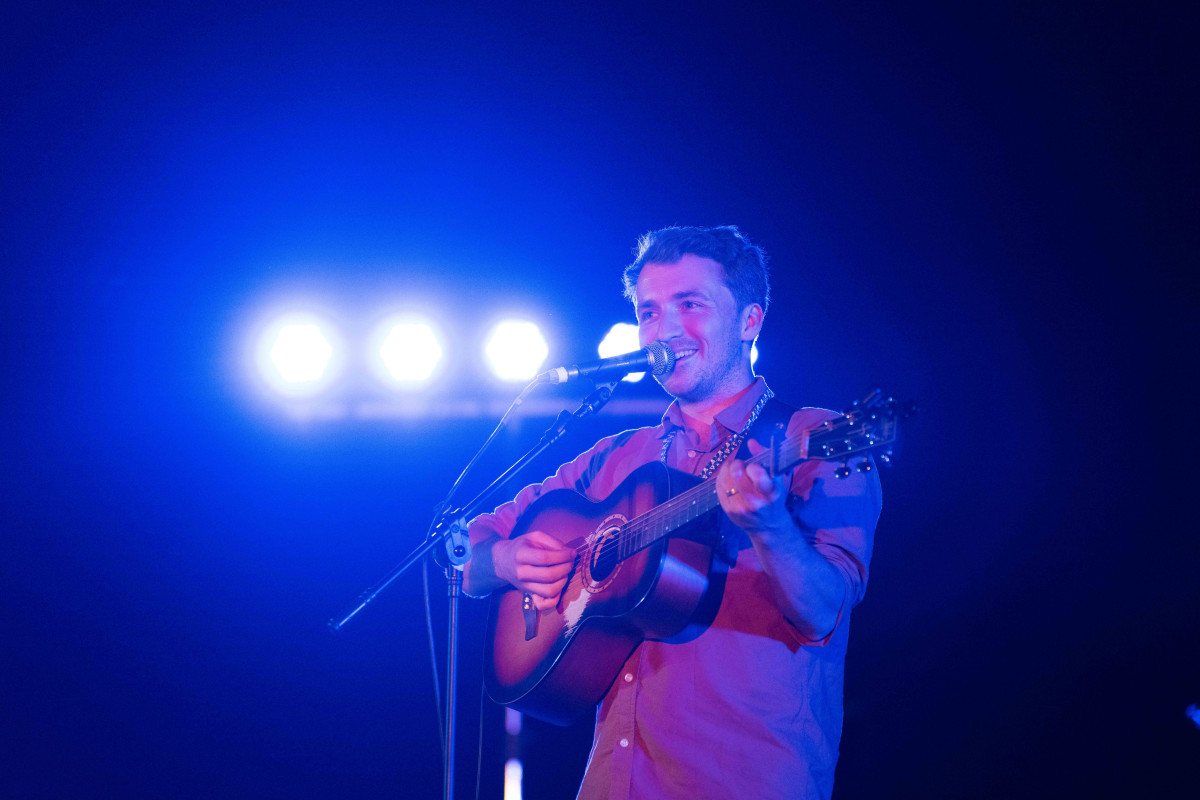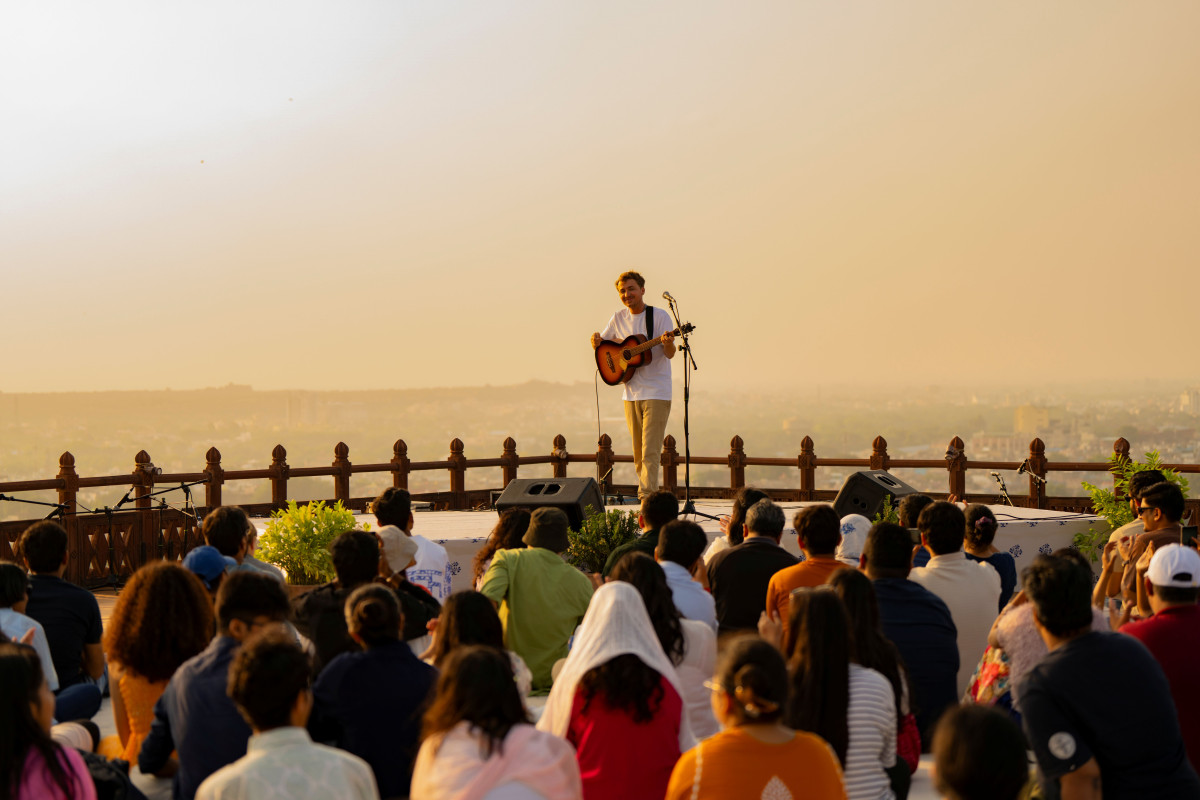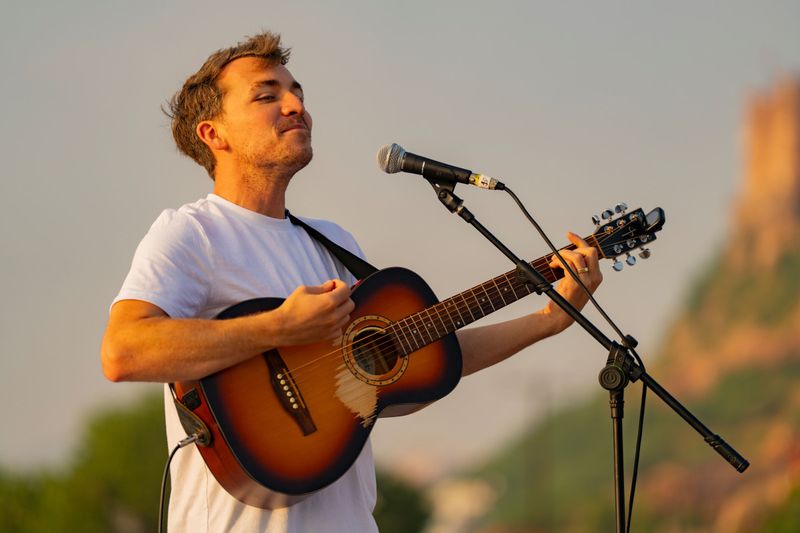Canadian singer-songwriter Luke Wallace believes in the capacity of human beings to be agents of change.
Jodhpur: Luke Wallace is a singer, songwriter, musician and filmmaker based in Vancouver, Canada. He plays the piano, guitar and harmonica. Apart from addressing environmental, social and political issues through his music, he also conducts workshops with people of different age groups on songwriting as a tool for activism.
He spoke to The Wire on the sidelines of Jodhpur RIFF, a folk music festival at the Mehrangarh Fort in Rajasthan, where he performed on October 2 and 6 during his recent India tour. He also performed at venues in Ahmedabad and Goa thereafter. His idealism is moving because it is not an escape from reality – he truly believes in the capacity of human beings to be agents of change. This view is best conveyed through his song ‘Our Time’, where he says, “I watch the hatred spreading like fire/ guess I’ll be the reason that hope grows higher/ oh I’d like to think I arrived right on time.”
Edited excerpts from the interview follow.
Using your music to raise environmental consciousness among listeners is important to you. How has your bachelor’s degree in environmental geography at the University of British Columbia helped you with this?
My studies and music have always been fairly harmonious. They feed each other. I had known since I was maybe 15 that I wanted to be a musician and perform. Singing was the thing that lit me up the most. And as I started entertaining that as a possibility more and more, I knew that it had to be about something more than music.
I also knew that, if I wanted to be an effective advocate for humanity, the earth and peace, I had to have some base knowledge and credibility to lean on. I wanted to feel confident and solid in my advocacy. The more you study the earth’s systems, weather patterns and ocean currents, you realise that our universe is also creative and artistic and there is magic involved in it too. I find that very beautiful and it informs my music.
Often, parents advise children to pursue music as a hobby and choose a career that will ensure financial security. How did you deal with those concerns? What gave you the courage to pursue music, and not just music for music’s sake but music that is responsive to social, ecological and political issues?
That is a great question! I have very supportive parents who love me. I have a twin sister, and we are the youngest of five siblings. For Canada, ours is a big family. The expectations are different when you are the youngest; there’s a lot of freedom.
There is a certain degree of privilege associated with being able to pursue a creative career and life. I have a very high tolerance for risk. I am currently riding the poverty line in Canada financially, but my lived experience is not like that at all. The amount in my bank account fluctuates a lot. When I make an album or go on a tour, I spend all my money and hope to make it back. I can take risks like that because I will never, functionally speaking, be homeless or poor. I can always go back to my family and my wife’s family. Also, my community in Vancouver is very supportive of what I do.
I have been touring for long enough now, so I have a sense of extended family all over British Columbia. Many people consider me like a son, and this fills me with courage and confidence to keep doing what I’m doing. A creative life is defined by an ongoing financial risk and the risk of putting yourself out there, hoping that people receive it well.
When I started studying the world in my teens and seeing conflict and inequality all over, it sparked this question for me about what I should do with the privilege that I have. I have been blessed with the ability to follow what brings me joy, so to pair that up with what the world is in need of or how I can serve best is the call that I am answering.
You are answering a question about the economics of a creative life in mystical and spiritual terms. Is this how you see the world, and your place in it?
In many ways, yes! I recognise the earth itself as an intelligent being, a being that is calling out to us to remember our connection and to be in community with each other.

Luke Wallace performing in Jodhpur. Photo: Jodhpur RIFF/OIJO
The idea of the musician as an entrepreneur is framed within a capitalist ethos. In the context of folk music, it is usually the responsibility of the community to look after the musician, and the musician serves the function of bringing the community together on significant occasions, transmitting oral tradition and helping them process emotions. As a folk musician, how do you locate yourself in that ecosystem? How do you make space for yourself?
My experience has very much felt like I’ve had to carve it out myself. I don’t mean to downplay the fact that there is a long lineage of people doing what I’m doing. I recognise that I am tapping into that, but building something on my own and finding my people took a long time. It was a deep and formative experience. When I go into different communities in Canada, and everyone gathers around music, it is an amazing experience as an artist because it is different from the mainstream way of doing things. The music is not being consumed. It is rooted in relationships. I have their blessings.
To what extent are your ideas about community shaped by your interactions with indigenous people from Canada? There is an increasing awareness of how contemporary Canadian society was built on the exploitation of indigenous people and their land. As a citizen who cares about justice and peace, how do you engage with that history and how it bleeds into the present?
The treatment of indigenous people by the state of Canada was and still is in many ways quite brutal, and is in line with most colonial experiences of indigenous people all over the world. Indigenous people in Canada experienced a massive genocide. Many of them died through disease and war and colonisation. The final sort of frontier of colonisation in Canada was the west coast, where I am from, where there are still to this day unceded or non-treatied nations that identify as sovereign. [They are] living in what you’d call ‘reservations’ right now, but are successfully staking massive territorial claims, saying that it is their traditional area and they have evidence of harvesting and hunting. They have a relationship to the land that goes back several generations.
These sovereign nations have been taking their claims to the Supreme Court and winning, so we are in the middle of a resurgence and clarification of indigenous sovereignty within what is currently known as Canada. My experience and relationship to many indigenous people in First Nations on the west coast of Canada has been through allyship around resource extraction – particularly gas pipelines – and closed containment salmon farming which I’ve been a vocal advocate against. My song ‘Non-Violent Anti-Petroleum Blues’, which was shot in British Columbia, is an example.
I don’t want to centre myself too much in these conversations, but I spent time in a place called Lelu Island, which was resisting a fracking terminal near Prince Rupert, BC. I made a few documentary films to help stop pipelines, and worked on the soundtracks for those. I have done similar work with my friend Alex Harris where we travelled deep into Alaska to film the largest salmon fishery on earth. Called Fish First, it is also a look into the harmony that has been achieved between indigenous people in Alaska and the settler American fishing community, and how they have found a way to make it work.
All this loops back to your question around how my knowledge and experience of community has been informed by indigenous people in British Columbia. I have been incredibly lucky to sit with and learn from indigenous elders, and I have been dumbfounded by their clarity around how the health of the land and rivers is inseparable from the health of human beings. When one is unhealthy, the other is unhealthy. When one is healthy, the other is healthy. Many of these elders went through the harshest forms of colonisation. Their families were murdered. They were put through Catholic residential schools that attempted to “beat the Indian out of the child”. They survived these schools as young children. And now as elders in their community, they are renewing and regenerating their indigenous languages, stories and knowledge.
Many of the allies and white settlers in Canada, including myself, feel tremendous gratitude to be welcomed into these conversations, and for the opportunity to be in community with these elders, given what many of our ancestors participated in.

Luke Wallace performing in Jodhpur. Photo: Jodhpur RIFF/OIJO
You have been a vocal critic of the Canadian government’s support for Israel. Why was it important for you to speak out against the genocide in Gaza?
It is very important to me to that there is a material change because of my advocacy, whether that involves protecting forests or ending a genocide, but I have no way to assess that impact. There was a point when I could feel my soul starting to rot, and it was very visceral. I probably felt it too late because of the shelter of my privilege.
How are we supposed to just sit quietly and not say something while a genocide is on? Solidarity is not about how many followers you have online. It’s about asking yourself how you can sleep soundly at night knowing that you didn’t do a thing to advocate for an end to what is clearly the most extreme injustice since the Second World War.
People who are speaking out against the genocide are being deemed hateful. We are being called anti-Semitic. If that’s the cost of advocacy, it’s fine because that’s nothing compared to the Palestinians in Gaza who have lost their entire families because of Israeli airstrikes. What’s probably holding a lot of people back from saying something or going to protest marches is the fact that they want to continue to belong to the circles that they are part of. That is a very natural human thing. But if somebody doesn’t want to be around me because I think everybody deserves dignity, I’m not so concerned about being in community with those people or about what they think of my beliefs.
I wrote a song called ‘Bird’s Eye View’, which talks about how you can find yourself in someone’s struggle, and rise above divisions. When I began to post about Gaza on social media, people told me that I don’t understand what’s really going on and that things are more complicated. That’s bullshit. There is a network of global power holders who want to continue to maintain control in the region, and I wanted to find a way to reflect upon the illegitimacy of that position. I am sorry that I live in a country that’s benefiting from a power structure that does not care about the dignity of Palestinians.
How does it feel to come and perform in India, a country with a long history of solidarity with the Palestinian freedom struggle and close ties to Israel?
I have been very surprised and renewed by the proactiveness with which people in India want to talk about Palestine as well as indigenous rights in Canada. That’s just so cool, even though it’s not what I was expecting. The people I have met during my time in India seem to be really concerned about the earth, not just their own community. They are politically savvy. I think there is a trillion-dollar industry all set to convince us that the world is a terrible place full of terrible people. It is worth asking who benefits from this narrative because my experience as a touring musician is that people care.
Chintan Girish Modi is a journalist, educator and literary critic. He can be reached @chintanwriting on Instagram and X.
This article went live on October nineteenth, two thousand twenty five, at zero minutes past eight in the morning.
The Wire is now on WhatsApp. Follow our channel for sharp analysis and opinions on the latest developments.

